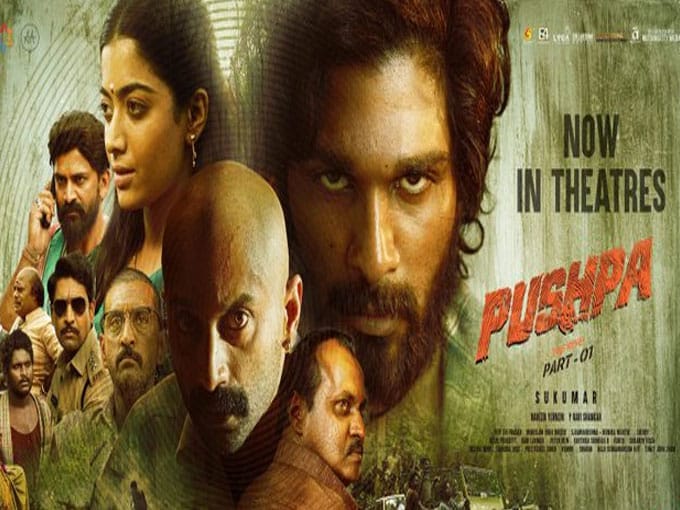Pushpa: The Rise Movie Review: Allu Arjun Shines in an Otherwise Clichéd Gangster Thriller
Director Sukumar’s much-anticipated film, Pushpa: The Rise, starring Allu Arjun, Rashmika Mandanna, and Fahadh Faasil, has finally hit the screens, delivering a gangster thriller that’s both gripping and familiar

New Delhi: Director Sukumar’s much-anticipated film, Pushpa: The Rise, starring Allu Arjun, Rashmika Mandanna, and Fahadh Faasil, has finally hit the screens, delivering a gangster thriller that’s both gripping and familiar.
While the film follows a conventional narrative, it’s Allu Arjun’s magnetic performance that truly steals the show, keeping the audience engaged despite the predictable plot.
Following his blockbuster Ala Vaikunthapurramuloo, Allu Arjun returns as Pushpa Raj, a street-smart, daily-wage laborer who gets involved in the illegal red sandalwood trade. As he rises to power in a smuggling syndicate, Pushpa makes enemies and faces countless challenges, which form the crux of the story.
Set against the backdrop of Andhra Pradesh’s red sandalwood smuggling, the film starts with an animated sequence that sets the stage before diving into the story. However, it takes its time to develop characters, focusing more on setting up the syndicate and its hierarchy rather than offering any substantial new twists. The screenplay, though engaging, feels a bit slow, lacking depth in some areas.
Despite the familiar gangster trope, Pushpa holds attention thanks to Allu Arjun’s immersive performance. His portrayal of Pushpa Raj, with his distinct twang and the iconic left-shoulder lift, makes the character compelling, even if the quirks feel somewhat forced. Allu Arjun’s delivery of lines and his emotional range elevate the film, making it a performance-driven thriller.
The supporting cast, unfortunately, falls short. Rashmika Mandanna’s role as Sri Valli is primarily designed to cater to the male gaze, and her character doesn’t contribute much to the story. Fahadh Faasil’s character, Bhanwar Singh Shekhawat, is introduced late in the film and fails to create the impact expected from a primary antagonist. While Fahadh delivers his lines with menace, his character lacks sufficient depth to make a lasting impression.
One of the standout supporting performances comes from Sunil, who plays Mangalam Srinu, a key figure in the smuggling syndicate. Sunil’s performance adds some much-needed weight to the narrative, bringing the necessary gravitas to his role.
While Pushpa takes risks with its narrative, including an item song that critiques the lustful gaze of men, the execution still feels problematic. Samantha’s Oo Antava item number is refreshing in its theme but still relies heavily on the male gaze, undermining the song’s original intent.
A recurring subplot involving the ridicule of Pushpa Raj’s mother by his father’s legitimate children feels unnecessary and over-the-top, lacking a proper resolution by the film’s end.
Despite its flaws, Pushpa: The Rise succeeds in making a lasting impact due to two main factors: the pulsating music by Devi Sri Prasad and the impeccable cinematography by Miroslaw Kuba Brozek. The film’s background score adds a powerful layer to the drama, while the visuals bring a gritty realism to the world of red sandalwood smuggling.
However, with a runtime of three hours, Pushpa does drag in parts, leaving the audience wondering if the second installment, Pushpa: The Rule, will manage to sustain the momentum and keep viewers invested for the long haul.
Verdict: 3/5 stars.
Despite its narrative flaws, Pushpa: The Rise is a film worth watching, mainly because of Allu Arjun’s powerhouse performance, the gripping soundtrack, and the immersive world built by Sukumar. As we await the next chapter, the question remains: Can Pushpa: The Rule continue this journey with the same intensity? Only time will tell.
